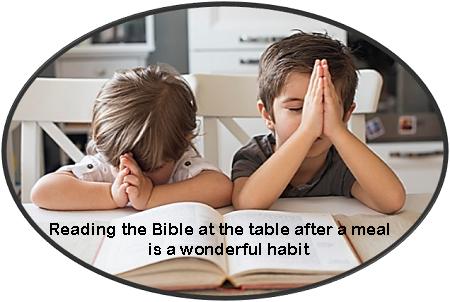Reading and Studying the Scriptures
Reading and Studying the Scriptures

Effective Bible study is largely a matter of good habits of work. Begin with firm determination; begin at once. Never wait until you are in the mood, or you may wait for weeks. Get in the mood by starting; the Bible creates its own mood. As J. C. Ryle says about it, “The way to do a thing is to do it.” The way to read the Bible is actually to read it – not wishing and meaning and resolving and intending and thinking about reading the Bible, but actually reading it. You will not advance one step until you have done that.
If you have a plan to guide you, then you have a head start. Indeed, if you do not have a plan you will never read the Bible. You may read parts, but never the whole Book, and you will never gain that familiarity with it which is so necessary if you are to benefit from the fullness of its message.
There are various plans which, if followed, will take you through the whole Bible in a year, or even the Old Testament once in a year and through the New Testament and Psalms twice. They are ambitious programs of reading which require reading at least three or four chapters a day.
To follow such schemes is an ideal for a believer. It is true that there have been more ambitious goals attempted and attained. Samuel Annesley, John Wesley’s grandfather, as a child of five or six began to read twenty chapters a day and continued that throughout his life.
Arthur Pink wrote to a friend,
In my early years ... I read through the entire Bible three times a year (eight chapters in the Old Testament and two in the New Testament daily). I steadily persevered in this for ten years in order to familiarize myself with its contents, which can only be done by consecutive reading.Letters of A. W. Pink, 23
Few Christians today have that stamina.
Reading the Bible at the table after a meal is a wonderful habit; it should be the goal for every family. To make the most of it, each person should have a Bible open before him. In that way, one’s thoughts can be prevented from wandering too wildly and everyone can join in the discussion after the passage is read. Such comments are necessary if the main thrust of the passage is to be understood by all present.
C. H. Spurgeon suggested,
Every minister ought to read Matthew Henry entirely and carefully through once at least. I should recommend you to get through it in the next twelve months after you leave college. Begin at the beginning and resolve that you will traverse the goodly land from Dan to Beersheba. You will acquire a vast store of sermons if you read with your note-book close at hand: and as for thoughts, they will swarm around you like twittering swallows around an old gable towards the close of autumn.Commenting and Commentaries, 3

The chief aim of studying the Scriptures is not the amount read or even the reading itself. The aim is to know God. It is not to pacify our consciences that we are obeying our minister’s exhortations and reading the Scriptures. Yet encouragements to persevere in reading can help, especially in the initial stages. For example, a congregation could adopt a scheme and distribute an outline throughout the membership. One of the readings in the Sunday service could be the set chapter for the day, at least in the first months. In Wales, children memorize verses from the Scriptures during the week and recite them on the Lord’s Day. They could select verses from the passages allocated as week follows week.
In whatever ways we adapt the suggested plan to our own particular needs, we must aim at reading two or three chapters at a sitting, or a whole book or epistle. There are many precious things we shall never see unless we read the Word of God in large chunks. We would never read fifteen lines of any other piece of literature and then set it aside, believing that we had thus satisfied the author’s original intentions. To see the whole massive movement of biblical thought, the Scriptures need to be read frequently and from Genesis to Revelation. The Christian must be content with nothing less. He will not understand the individual verses unless he has the framework of knowledge which a larger acquaintance with Scripture provides. The more he reads, the more comprehensible the Bible becomes.

Add new comment